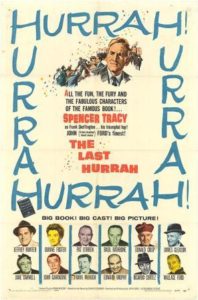“One more regret at my age won’t make much difference.”—— Mayor Frank Skeffington (Spencer Tracy)
The 1958 The Last Hurrah was kind of a last hurrah of its own, among the last gatherings of the John Ford clan—the director’s lovable Irishmen and a host of his favorite supporting players, Irish or not, from as far back as the 1920s. It was a last fling in much the same way that, in 1962, The Man Who Shot Liberty Valance marked the end of Ford’s long string of great Westerns that had begun, certainly with Stagecoach in 1939, and, some would say, even earlier, in 1924, with The Iron Horse.
The “hurrah” of the movie, based on the novel by Edwin O’Connor about the life of Boston Mayor James Curley, is centered around a fictional mayor in one last re-election bid, his own personal last hurrah. The extravagant, larger-than-life role of Frank Skeffington is played will full force by its star Spencer Tracy, who said it was a better performance than his The Old Man and the Sea, made the same year. Against Skeffington is his age, a different ethnic demography, the changing times, the advent of television, which he doesn’t understand, and the still clear memories and malice of his enemies.
The initial release of The Last Hurrah was not a success, losing $1.8 million. The film is, in fact, from another movie era—and Ford knew he was too, that he and his type of pictures, about family, camaraderie, endurance, tradition and so many other things regarding the heart and nostalgia, had gone out of style. Granted, while the film may be less than top-tier John Ford, due to some ludicrous miscastings and oversights in execution, it has all the Ford ingredients just mentioned.
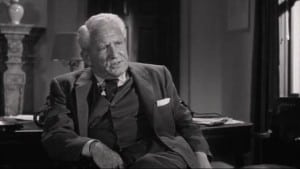 For every single traditional movie made in 1958—and there were a few: The Big Country, Gigi, Houseboat—there was a disparate kind that spoke of violence, horror, sex, murder or simple weary twentieth-century malaise: Vertigo, Cat on a Hot Tin Roof, Touch of Evil, The Fly, Separate Tables. By subsequent standards, 1958 was a pretty tame year, but it was only the beginning; the topics of examination, often graphically portrayed, would gradually become more “liberated” and sensational.
For every single traditional movie made in 1958—and there were a few: The Big Country, Gigi, Houseboat—there was a disparate kind that spoke of violence, horror, sex, murder or simple weary twentieth-century malaise: Vertigo, Cat on a Hot Tin Roof, Touch of Evil, The Fly, Separate Tables. By subsequent standards, 1958 was a pretty tame year, but it was only the beginning; the topics of examination, often graphically portrayed, would gradually become more “liberated” and sensational.
Some critics, movie-goers, too, have said The Last Hurrah is too slow, too sentimental and too old-fashioned. Absolutely. I agree. It’s slow-moving enough for us to savor every nuance, every character study, every line of dialogue, though the film is strangely without a large quota of great lines, partially redeemed at film’s end by the best one of all. Yes, it’s wonderfully sentimental, about a simpler, easier time long gone. And, yes, it’s richly, exuberantly old-fashioned, with characters who reflect the best and worst in human nature—the kinds of people we know, not super heroes or weird monsters from other worlds that fill the movie screens today.
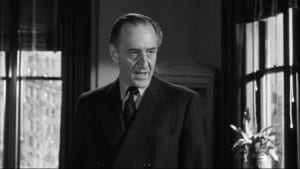 As in the case of cameo appearances, where viewers are easily distracted by looking for the next big star, the old-time supporting players, even those not necessarily Ford regulars, fill the screen canvas like beloved paintings hanging on the wall: James Gleason; Rand Brooks, a nonentity except for Gone With the Wind; Basil Rathbone; Pat O’Brien, who had been absent from Ford films for sometime; Frank Albertson; Bob Sweeney, here in a comic caricature of himself; Basil Ruysdael, generally overlooked in films, but memorable as the parson in The Horse Soldiers; Dianne Foster; Donald Crisp, in another wise, benevolent role; and Wallace Ford.
As in the case of cameo appearances, where viewers are easily distracted by looking for the next big star, the old-time supporting players, even those not necessarily Ford regulars, fill the screen canvas like beloved paintings hanging on the wall: James Gleason; Rand Brooks, a nonentity except for Gone With the Wind; Basil Rathbone; Pat O’Brien, who had been absent from Ford films for sometime; Frank Albertson; Bob Sweeney, here in a comic caricature of himself; Basil Ruysdael, generally overlooked in films, but memorable as the parson in The Horse Soldiers; Dianne Foster; Donald Crisp, in another wise, benevolent role; and Wallace Ford.
Among the especially special of Ford’s favorite actors, there is John Carradine, Willis Bouchey, Carleton Young, Frank McHugh, Edward Brophy, Mae Marsh, Ken Curtis, Jane Darwell and O.Z. Whitehead. It would be a last appearance for Charles Trowbridge and Ricardo Cortez, each leaving films after this appearance. Fred Kennedy, a favorite Ford stuntman, would die the following year in a fall from a horse in The Horse Soldiers.
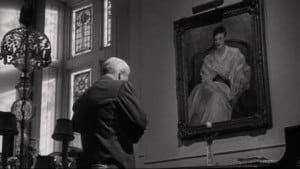 So, here’s this devoted Irish-Catholic, Frank Skeffington (Tracy), running for yet another term as mayor. Each morning when he descends the stairs in his above middle class home, he deposits a fresh rose in a vase beneath a painting of his late wife. Skeffington has a genial exterior, makes friends easily and has an uncanny power of persuasion—if a friendly approach fails, then intimidation or the demand for the return of a favor, and, too, there’s always the Skeffington political machine.
So, here’s this devoted Irish-Catholic, Frank Skeffington (Tracy), running for yet another term as mayor. Each morning when he descends the stairs in his above middle class home, he deposits a fresh rose in a vase beneath a painting of his late wife. Skeffington has a genial exterior, makes friends easily and has an uncanny power of persuasion—if a friendly approach fails, then intimidation or the demand for the return of a favor, and, too, there’s always the Skeffington political machine.
He has made a lot of enemies who oppose his re-election—a banker (Rathbone), a newspaper publisher (Carradine) and two clergymen, a Catholic cardinal (Crisp), a boyhood friend, and a Protestant bishop (Ruysdael), something of an outsider among the Irish-Catholics around him. These men are supporting a politically inexperienced Catholic and war veteran, Kevin McCluskey (Charles B. Fitzsimons, perhaps better known as Hugh Forbes in The Quiet Man).
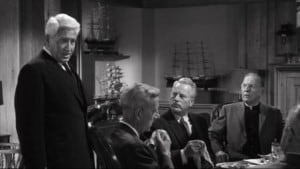 Among the many who support Skeffington are an old friend and faithful lapdog (Brophy, playing himself) and a sportswriter (Jeffrey Hunter, impressive in The Searchers, but whose character here, though likeable, seems unintegrated into the film); even his father-in-law (Bouchey) is against the current mayor.
Among the many who support Skeffington are an old friend and faithful lapdog (Brophy, playing himself) and a sportswriter (Jeffrey Hunter, impressive in The Searchers, but whose character here, though likeable, seems unintegrated into the film); even his father-in-law (Bouchey) is against the current mayor.
At one point, Skeffington barges into the hallowed—at least to its members—Plymouth Club, full of the town officials, and threatens to embarrass the banker’s family by appointing his idiot son (Whitehead) as fire commissioner unless the bank approves a loan for a housing development which had been turned down. (Whitehead’s Lou Costello-type comedy, which Ford oddly allowed, is totally incongruous with the subdued ambiance of the story.) In reaching out to his constituents in his old-fashioned, hands-on style, Skeffington meets and greets and gives speeches at dinners and rallies. At a friend’s funeral, having begun quite genially but without success in his coaxing, Skeffington cunningly, with guile and threats, though still with smiles, a gentle voice and friendly hands on the shoulders, “persuades” the undertaker to lower his fee to less than $100. Before, Skeffington had secretly given the needy widow a $1,000. So—two quite different sides of the mayor.
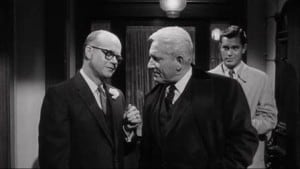 Akin to the Whitehead performance, in a misguided scene that runs on far too long, McCluskey appears on TV in one of those candidate-and-family-at-home interviews. His wife (Helen Westcott), portraying a housewife unaccustomed to the camera, is nervous, awkward and clumsy enough to be mistaken for a refugee from a slapstick comedy.
Akin to the Whitehead performance, in a misguided scene that runs on far too long, McCluskey appears on TV in one of those candidate-and-family-at-home interviews. His wife (Helen Westcott), portraying a housewife unaccustomed to the camera, is nervous, awkward and clumsy enough to be mistaken for a refugee from a slapstick comedy.
At the beginning of election night, Skeffington is winning, but by the last returns, he has clearly lost. While his prognosticators are arguing over why their political machine failed, Skeffington takes it all in stride and announces before the TV cameras that he plans to run for governor—and, he adds, will win. He walks home alone through a park, the lonely shadows unreflective, somehow, of his mood.
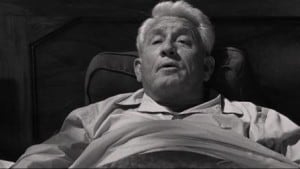 On the staircase beneath the portrait of his wife, he has a heart attack and is put to bed. The doctor (William Forrest) gives little hope and demands total isolation, but Skeffington refuses to be deprived of his friends. After he is given the Last Rites, the friends gather around the bed, including the cardinal, who shares a quiet overview of the patient’s life, good and bad. When the sportswriter’s father-in-law says that Skeffington would surely live his life differently if he had the chance, the mayor is conscious enough before dying to say, “Like hell I would!”
On the staircase beneath the portrait of his wife, he has a heart attack and is put to bed. The doctor (William Forrest) gives little hope and demands total isolation, but Skeffington refuses to be deprived of his friends. After he is given the Last Rites, the friends gather around the bed, including the cardinal, who shares a quiet overview of the patient’s life, good and bad. When the sportswriter’s father-in-law says that Skeffington would surely live his life differently if he had the chance, the mayor is conscious enough before dying to say, “Like hell I would!”
By the time Ford, already slowing down physically, made The Last Hurrah, he had lost some of his enthusiasm for films, a decline that would increase with the coming years. This may account for the lapses in this movie. Excluding the shared co-direction of How the West Was Won, he would make only seven more theatrical films, all reflecting this decline, except for one last spark of the former, ever-sure John Ford in The Man Who Shot Liberty Valance.
